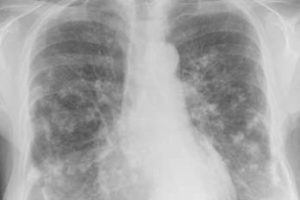Mesothelioma Symptoms and Diagnosis
New Jersey Mesothelioma Attorneys Suggest Treatment Options
 Even if you are aware of your possible history of asbestos exposure, a mesothelioma diagnosis is often overwhelming. However, though there is no cure for this type of cancer, treatment options are available in some cases. Therefore, understanding the common symptoms of mesothelioma can help ensure that you are diagnosed early, which in turn gives you the best chance of receiving effective treatment.
Even if you are aware of your possible history of asbestos exposure, a mesothelioma diagnosis is often overwhelming. However, though there is no cure for this type of cancer, treatment options are available in some cases. Therefore, understanding the common symptoms of mesothelioma can help ensure that you are diagnosed early, which in turn gives you the best chance of receiving effective treatment.
Although you should first seek medical advice after a mesothelioma diagnosis, legal advice can also be beneficial to mesothelioma victims and their families. You may be entitled to compensation from the company or person responsible for your asbestos exposure. This money can help you pay for mesothelioma treatment, as well as provide for your family’s financial future. The mesothelioma lawyers at Keefe Law Firm can represent you in an asbestos lawsuit and help ensure you get the full compensation you deserve.
What are the Symptoms of Mesothelioma?
Mesothelioma is diagnosed by conducting assessments to find abnormalities in the mesothelium, or soft tissue protecting the organs. Usually, a medical professional will review a patient’s medical history and then order a complete physical examination. This typically includes x-rays of the chest or abdomen. Finally, an oncologist must complete a biopsy to confirm a lung cancer diagnosis.
However, the initial symptoms of mesothelioma are often mild, and may be easily confused with less serious conditions. Your symptoms may also vary depending on the type of cancer you have. As a result, you may not receive a mesothelioma diagnosis until several months after your initial appointment. Below, our mesothelioma attorneys explain common signs and symptoms of mesothelioma.
Pleural mesothelioma: Pleural mesothelioma is most common and affects the soft tissue surrounding the lungs. Over 2,000 people receive a pleural mesothelioma diagnosis each year in the U.S., according to The Mesothelioma Center. Symptoms include:
- Fever
- Night sweats
- Weight loss
- Loss of appetite
- Shortness of breath
- Chest pain
- Persistent cough
- Hemoptysis (coughing up blood)
- Dysphagia (difficulty swallowing)
Many of these symptoms result from pleural effusion. This is a buildup of fluid within the chest cavity, which then interferes with normal lung function.
Peritoneal mesothelioma: Peritoneal mesothelioma affects the abdomen, and there are only 200 to 600 new cases annually. Symptoms include:
- Shortness of breath
- Hoarseness
- Difficulty swallowing
- Pain or swelling in the abdomen
- Bowel constrictions
- Diarrhea
- Coughing up blood
- Anemia
- Pleural effusions
- Blood clotting
- Chest pain
- Swelling in face and neck
- Weight loss
Pericardial Mesothelioma: Pericardial mesothelioma is the rarest form of mesothelioma, with approximately 30 new cases per year. It affects the lining of the heart and is often diagnosed too late to treat effectively. Symptoms include:
- Persistent coughing
- Palpitations
- Coughing up blood
- Nausea and vomiting
- Shortness of breath
- Weight loss
- Chest pain
What are the Stages of Mesothelioma?
Mesothelioma generally consists of cancerous tumors that form in the soft tissue inside the chest. If a doctor diagnoses this cancer early enough, then treatment may include removal of the tumors, or possibly removal of the lung. However, as the cancer progresses and worsens, fewer treatment options may be available.
While there are several ways to categorize the stages of mesothelioma, the following serves as one chart utilized by medical professionals to categorize the severity of the mesothelioma tumor as an aid in prescribing the appropriate treatments:
- Stage I: The tumor is small and does not stretch further than the soft tissue of the mesothelium. It has no effect on the lymph nodes or other parts of the body.
- Stage II: Removal of the tumor is possible at this stage. However, the mesothelioma starts to affect the surrounding lymph nodes.
- Stage III: During this stage, removal of the tumor is impossible. It extends from the chest wall, heart, through the diaphragm into the peritoneum.
- Stage IV: During this stage the disease has spread to the vital organs such as the liver, brain or bloodstream.
Diagnosed with Mesothelioma? Contact Our New Jersey Law Firm Today
If you or a loved one has received a mesothelioma diagnosis, you may be entitled to recover compensation through an asbestos lawsuit. Our New Jersey mesothelioma attorneys can investigate your work history in order to determine who is liable for your injuries. We will then advise you on your options for compensation, which may include a bankruptcy trust or a personal injury case against your former employer.
Our law firm has offices throughout New Jersey, including locations in Red Bank as well as New Brunswick, Newark, and Point Pleasant. However, we do accept mesothelioma cases nationwide. Contact us online or call one of our offices to schedule a free initial consultation today.
